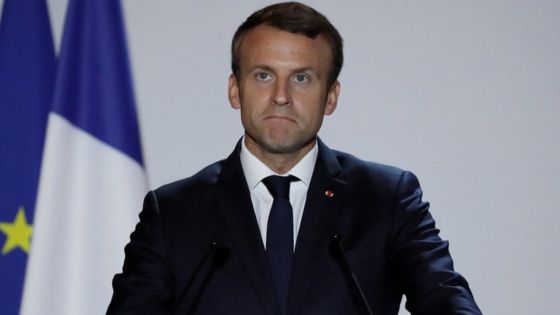
The UK must provide more clarity about its negotiating position on Brexit, the French president has said.
Emmanuel Macron said the issues of EU citizens, the exit bill and the Irish border question must be settled before talks could be held on trade.
On Friday, Theresa May made suggestions including a two-year transition period after Brexit, and that the UK pay the EU for "commitments" previously made.
She hoped this offer, made in a speech in Italy, would unblock Brexit talks.
In the first response by a European leader to the speech, Mr Macron welcomed her initiative, but said the British position still needed to be fleshed out.
"Before we move forward, we wish to clarify the issue of the regulation of European citizens, the financial terms of the exit and the question of Ireland," he said.
"If those three points are not clarified, then we cannot move forward on the rest."
Mrs May said there should be a transition period of "about" two years after March 2019 - when the UK leaves the EU - during which trade should continue on current terms
EU migrants would still be able to live and work in the UK but they would have to register with the authorities, under her proposals.
And she said the UK would pay into the EU budget for decisions made while it was a member, so other member states are not left out of pocket.
`We have not left`
She did not specify how much the UK would be prepared to pay during the transition period, but it has been estimated as being at least 20bn euros (about £18bn).
Mrs May`s speech was welcomed by senior Conservative figures including Foreign Secretary Boris Johnson and Chancellor Philip Hammond.
But backbench MP Jacob Rees-Mogg criticised the PM`s stance on freedom of movement - saying it should end in March 2019 - offering the union money, and the role of the European Courts of Justice on Britain.
He told BBC Newsnight it was a "red line" if the UK was still subject to the ECJ after March 2019. If it was, "we have not left the European Union", he said.
The prime minister, in her speech, also suggested a "bold new security agreement" and said the UK would be the EU`s "strongest partner and friend".
On trade, she said the two sides could do "so much better" than adopt existing models, adding there was "no need to impose tariffs where there are none now".
She also suggested that the UK and EU would continue working together on projects promoting long-term economic development and the UK would want to "make an ongoing contribution to cover our fair share of the costs involved".
When the two-year transition period was up, the UK and EU could move towards a new "deep and special partnership," she said.
But by March 2019, neither the UK or EU would be ready to "smoothly" implement new arrangements needed so suggested current trade terms should remain in place.
Such a period should be "time limited", she said, with its length being determined by how long it takes to set up new systems.
Analysis
By BBC Political Editor Laura Kuenssberg
It`s been pretty well established in Whitehall for many months; the most eager Brexiteers who wanted short, sharp exit lost that battle some time ago.
And her acknowledgment of that today pulls against her repeated insistence in the election that the public just want politicians to "get on with it".
And there were new nuggets of information that will influence the talks.
The prime minister gave an unconditional guarantee of security co-operation with the rest of the EU, whether you think that is the right thing to do or the loss of a potentially powerful bargaining tool.
And Number 10 believe their offer on enhanced legal protections for EU citizens takes them closer to a deal.
Read Laura`s full blog
But she hoped to build a "comprehensive and ambitious" new economic partnership with the EU in the long-term.
To EU citizens in the UK she offered reassurance that "we want you to stay, we value you" and acknowledged differences with the EU over which courts should guarantee their rights after Brexit.
She said she wanted UK courts to take account of rulings by the European Court of Justice and hoped "on this basis, our teams can reach firm agreement quickly".
Mrs May said Brexit was a "critical time" for both sides but she looked ahead with "optimism".
`Listened to Labour`
The EU`s chief Brexit negotiator Michel Barnier described the speech as "constructive" and said the prime minister had shown "a willingness to move forward".
But he added that while her statements on EU citizens were "a step forward", they "must now be translated into a precise negotiating position of the UK government".
And he said he would have to examine the "concrete implications" of the UK`s pledge that no member state would have to pay more as a result of Brexit.
The European Parliament`s Brexit negotiator Guy Verhofstadt, said the UK`s position was becoming "more realistic" but registering EU citizens was "out of the question".
Labour Leader Jeremy Corbyn said the speech suggested the PM had "listened to Labour" and acknowledged a transition was needed to provide stability for businesses and workers.
Mr Barnier meets Brexit Secretary David Davis for a fourth round of talks on Monday.


0 comments:
Post a Comment